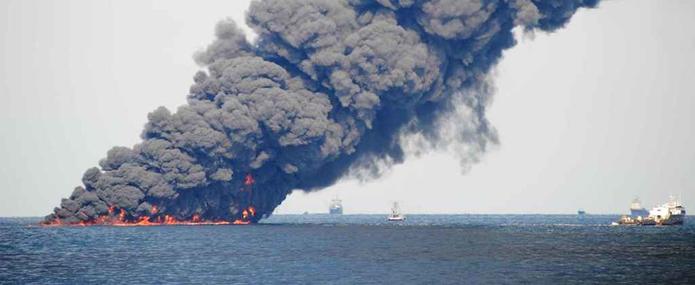April 20, 2020 marked the tenth anniversary of the Deepwater Horizon oil spill, a major environmental disaster that exposed critical shortcomings in the regulation of the offshore extractive sector. Ten years later, what is the state of regulation and have lessons been learned from this accident?
On 20 April 2010, the Deepwater Horizon oil rig operated by BP in the Gulf of Mexico exploded, killing 11 people and releasing the equivalent of 5 million barrels1 of oil for 87 days. The environmental consequences were colossal—the death of hundreds of thousands of animals, including 800,000 birds and 170,000 sea turtles2 —and the impact of the oil spill on the fishing and tourism sectors amounts to $1 billion and $500 million respectively.3, 4
At the national level, the approaches of regulatory authorities remain highly disparate. With the dual objective of preserving the marine environment and combating climate change, some states have chosen to tighten their regulations or even prohibit all new drilling – e.g. Belize, Costa Rica, France, Italy, New Zealand and some states in the United States, such as Florida. Others continue to promote the development of the sector. For example, Russia is developing new projects in the Arctic,5 the United States has recently modified its five-year 2017-2022 offshore licensing plan to open up new offshore areas,6 and Norway has recently expanded its offshore drilling zone.7
The Deepwater Horizon disaster had also highlighted gaps in international regulation and weak inter-State cooperation. Ten years later, the picture remains similar. The G20 considered the possibility of an international convention on platform safety, but it never came to fruition due to a lack of political consensus. Similarly, an Indonesian proposal to draw up international rules on liability and compensation8 was quickly buried amidst considerable opposition among the member countries of the International Maritime Organization (IMO). To date, oil and gas extraction remains the least regulated maritime activity under international law.
Progress has been most notable at the regional level, although still patchy and fragmented. In 2013, the European Union adopted a specific directive focusing on safety issues, but ignoring those relating to liability and compensation.9 In West Africa, States adopted a protocol to the Abidjan Convention in 2019, establishing environmental norms and standards for the sector. On the other side of the continent, the States Parties to the Nairobi Convention are also working together to regulate future operations. The adoption of common frameworks at the level of marine regions can encourage the exchange of experience between national authorities and strengthen cooperation in the fight against environmental dumping.10 However, the adoption of rules alone is insufficient and the challenge today is to implement them effectively in contexts where national capacities, particularly in terms of control, are often limited.
Thus, ten years after the Deepwater Horizon tragedy, the balance sheet remains mixed. Initiatives to improve the safety of platforms remain fragmented and the thorny issue of liability and compensation in the event of transboundary pollution has not yet been addressed. Africa, which is witnessing a significant development of extractive activities,11 is seeing the development of promising inter-state cooperation: the adoption of common rules thus contributes to a better environmental record and strengthens the weight of governments in the face of private initiatives. At the same time, it is necessary to ensure that the huge economic stakes do not undermine initiatives to improve the protection of the marine environment. In this respect, civil society has a crucial role to play in placing these issues at the heart of the political agenda and in imposing itself as a force for proposals—and, if necessary, for opposition—in the face of governments and companies.12
- 1A recent report estimates that the volume spilled would be 30% higher than originally calculated: I. Berenshtein, C. B. Paris, N. Perlin, M. M. Alloy, S. B. Joye, S. Murawski (2020). Invisible oil beyond the Deepwater Horizon satellite footprint. Sci. Adv. 6, eaaw8863
- 2 (in French) https://lemarin.ouest-france.fr/secteurs-activites/environnement/36440-deepwater-horizon-10-ans-apres-une-situation-alarmante-selon
- 3Oceana Report : Lessons we cannot ignore from the BP disaster, April 2020
- 4As "compensation", BP is estimated to have paid more than $65 billion to the United States, as the disaster occurred in waters under US sovereignty: https://www.theguardian.com/business/2018/jan/16/bps-deepwater-horizon-bill-tops-65bn
- 5(in French) https://www.sciencesetavenir.fr/politique/la-russie-investit-l-arctique_119205
- 6(in French) https://lemarin.ouest-france.fr/secteurs-activites/environnement/30308-trump-propose-de-rendre-accessible-les-eaux-us-aux-activites
- 7(in French) https://lemarin.ouest-france.fr/secteurs-activites/environnement/36506-norvege-vers-un-leger-changement-des-zones-accessibles-aux
- 8In 2009, the explosion of the Montara platform in Australian waters, which had caused pollution as far as the Timor Sea, had led Indonesia to propose the development of an international regime for liability and compensation for transboundary pollution resulting from offshore oil and gas exploration and exploitation activities.
- 9See https://www.persee.fr/doc/rjenv_0397-0299_2014_num_39_1_6224, and (in French) Rochette, J., Wemaëre, M., Chabason, L. Callet, S. (2014). En finir avec le bleu pétrole. Pour une meilleure régulation des activités pétrolières et gazières offshore, Studies N°01/14, IDDRI, Paris, France, 40 p.
- 10Competition between states to attract investment at the cost of lower environmental standards.
- 11(in French) https://www.ifpenergiesnouvelles.fr/article/nouvelles-decouvertes-petrole-et-gaz-2018
- 12This is precisely the objective of the COBIA initiative (https://cobia-africa.com/en/), which seeks to structure civil society in West Africa in order to demand the adoption of good environmental practices in the face of the development of the offshore sector.



